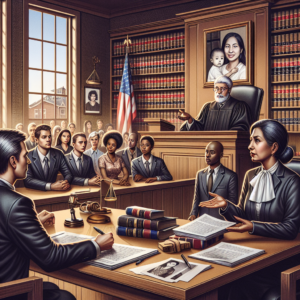Unveiling the Shocking Truth: School Discipline Laws and Their Impact
[caption id="attachment_32674" align="alignnone" width="622"] Family Law[/caption]
In recent years, the conversation surrounding school discipline laws has gained significant traction, revealing a complex web of regulations that govern student behavior and institutional responses. These laws are designed to maintain order and promote a conducive learning environment; however, their implementation often raises critical questions about fairness, effectiveness, and the broader implications for students' educational experiences. This article delves into the multifaceted nature of school discipline laws, examining their framework, historical evolution, impacts on student behavior and academic performance, existing disparities, legal challenges, and potential reforms aimed at fostering equity and effectiveness in education.
Understanding School Discipline Laws: A Comprehensive Overview of Their Framework and Purpose
School discipline laws serve as a foundational framework for managing student behavior within educational institutions. These laws encompass a range of policies and procedures that dictate how schools respond to misconduct, from minor infractions to serious offenses. The primary purpose of these regulations is to ensure a safe and orderly environment conducive to learning. They typically outline the rights and responsibilities of students, the roles of educators and administrators, and the consequences for various behaviors. While the intent is to uphold discipline, the application of these laws can vary significantly across different school districts, leading to a patchwork of practices that may not always align with the overarching goals of equity and justice.
The Historical Context of School Discipline: Evolution of Laws and Policies Over Time
The evolution of school discipline laws reflects broader societal changes and educational philosophies. Historically, discipline in schools was often characterized by strict, punitive measures, including corporal punishment and zero-tolerance policies. The mid-20th century saw a shift towards more rehabilitative approaches, influenced by civil rights movements and a growing understanding of child psychology. Landmark legislation, such as the Individuals with Disabilities Education Act (IDEA) and the No Child Left Behind Act, further shaped the landscape by emphasizing the need for inclusive practices and accountability. As educational stakeholders continue to grapple with the balance between maintaining order and supporting student well-being, the historical context of these laws remains crucial in understanding their current implications.
The Impact of School Discipline Laws on Student Behavior and Academic Performance
Research indicates that school discipline laws significantly influence student behavior and academic performance. When implemented effectively, these laws can foster a positive school climate, encouraging students to engage in pro-social behaviors and enhancing their academic outcomes. Conversely, overly punitive measures can lead to negative consequences, including increased dropout rates, lower academic achievement, and heightened feelings of alienation among students. Studies have shown that students subjected to harsh disciplinary actions are more likely to experience academic setbacks and disengagement from the educational process. Thus, the impact of these laws extends beyond immediate behavioral corrections, shaping the long-term trajectories of students' educational experiences.
Disparities in School Discipline: Examining Racial and Socioeconomic Inequities
One of the most pressing issues surrounding school discipline laws is the stark disparities that exist along racial and socioeconomic lines. Research consistently reveals that students of color, particularly Black and Latino students, face disproportionately harsher disciplinary actions compared to their white peers, even for similar infractions. This inequity is often exacerbated in schools located in low-income areas, where resources for support and intervention may be limited. Such disparities not only perpetuate systemic inequalities but also contribute to the school-to-prison pipeline, where students subjected to harsh disciplinary measures are more likely to encounter the juvenile justice system. Addressing these inequities is essential for creating a fair and just educational environment for all students.
Legal Challenges and Controversies: Landmark Cases Shaping School Discipline Practices
The landscape of school discipline laws has been significantly shaped by various legal challenges and landmark cases. Notable cases, such as Goss v. Lopez (1975), established that students have a right to due process in disciplinary proceedings, while Tinker v. Des Moines Independent Community School District (1969) affirmed students' rights to free speech within the school context. These cases have prompted schools to reevaluate their disciplinary policies to ensure compliance with constitutional protections. However, ongoing controversies, such as debates over the legality of suspensions and expulsions for non-violent offenses, continue to challenge the boundaries of school discipline laws. As legal precedents evolve, they play a crucial role in shaping the practices and policies that govern student behavior.
Future Directions: Reforming School Discipline Laws for Equity and Effectiveness in Education
Looking ahead, there is a growing consensus among educators, policymakers, and advocates that reforming school discipline laws is imperative for promoting equity and effectiveness in education. Efforts to shift from punitive approaches to restorative practices are gaining momentum, emphasizing the importance of understanding the root causes of behavior and fostering a supportive school climate. Additionally, integrating social-emotional learning and mental health resources into disciplinary frameworks can help address the underlying issues that contribute to misconduct. As stakeholders work collaboratively to develop more equitable and effective disciplinary policies, the focus must remain on creating safe, inclusive, and supportive educational environments that prioritize student growth and success.
The ongoing discourse surrounding school discipline laws underscores the need for a comprehensive understanding of their implications for students and educational institutions. As we navigate the complexities of these regulations, it is crucial to prioritize equity, fairness, and the holistic development of students. By examining historical contexts, current disparities, and potential reforms, we can work towards a future where school discipline laws not only maintain order but also foster an environment conducive to learning and personal growth for all students.
